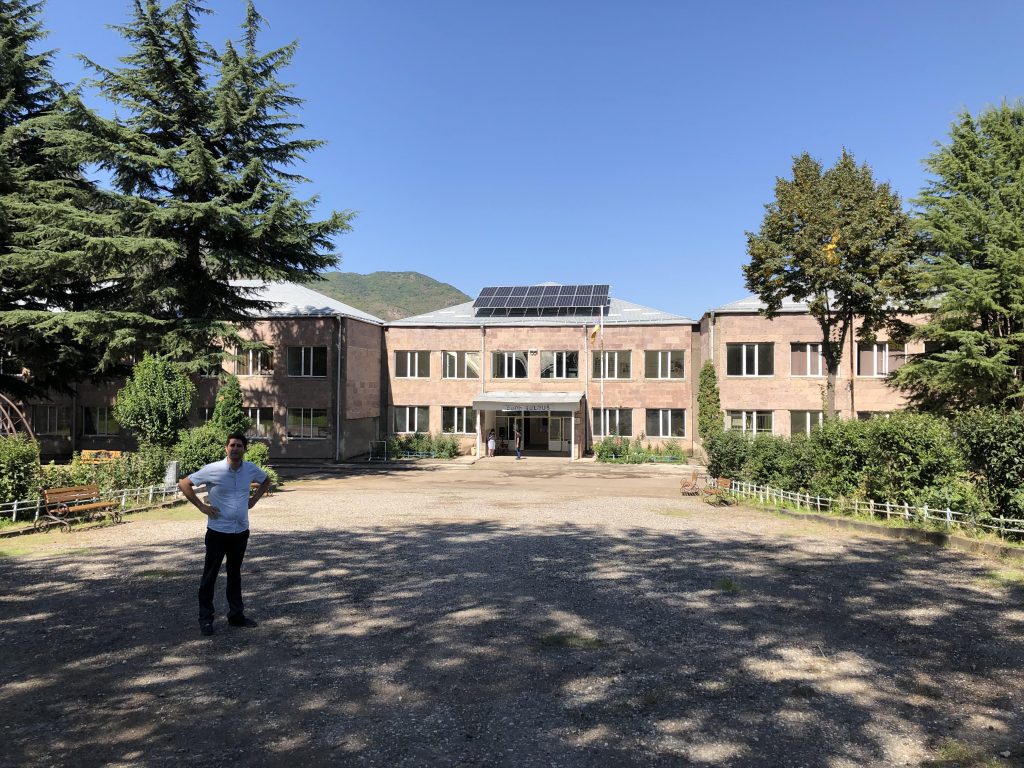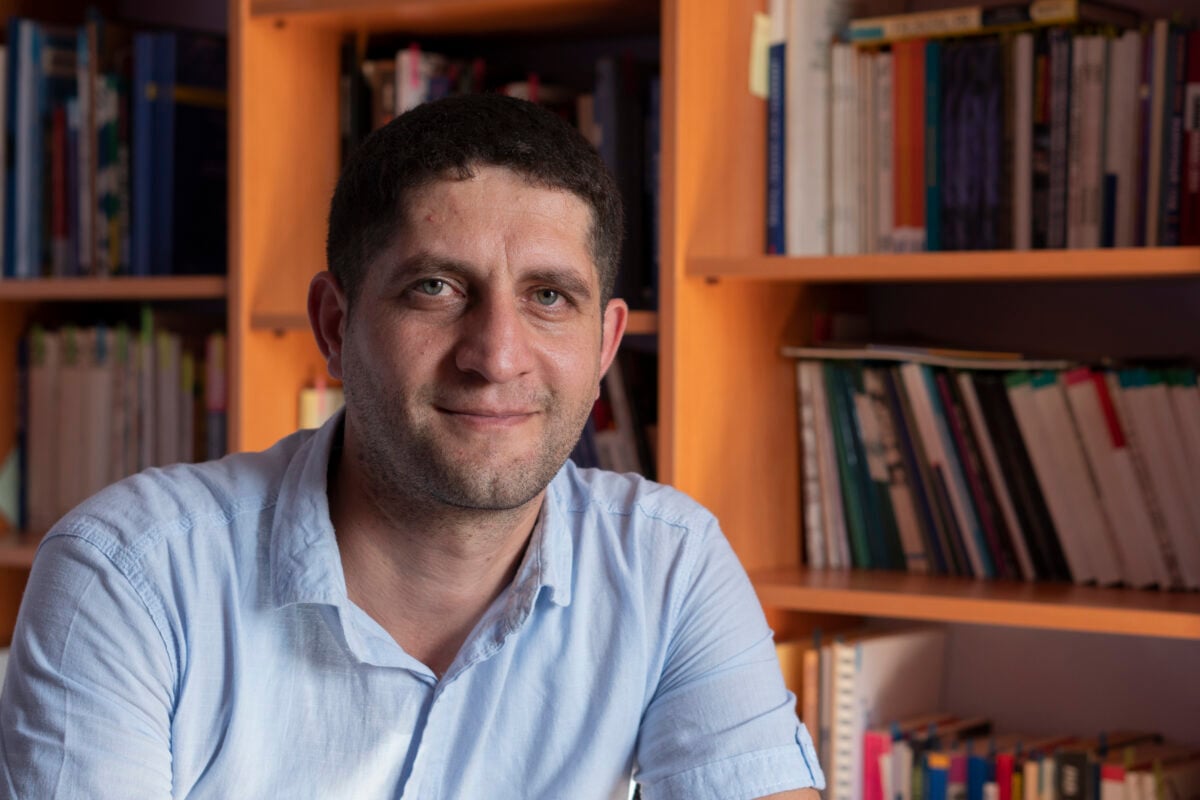When we talk about schools, we often come to the conclusion that school is an inevitable necessity, a commitment, a task to be done from childhood, in a group setting and with a well-written script.
For children, school is a place where they go without considering their wishes. They have to go and so they go, trying to find their place within the general rules. They may find it, but they may not.
We usually look at all the school issues from the kids’ perspective and regret that we do not have a better school system that could apart from teaching them to learn from childhood to obey but to continue to seek their own footsteps in this great world.
The desire to be part of the larger world is especially relevant in rural schools.
For example, the only secondary school in the border village of Aygedzor in the Tavush region, for example, is the main gathering place for interactions after compulsory classes.

Aygedzor Secondary School and Hayk Tsakhkyan
It is perhaps through the example of the school in that village that one can understand what can be considered the cornerstone of a school reform on which the philosophy of human-centered (not program-centered) education is built.
To put it simply, what can help prevent children from searching for something? To make their commitment also fun, full of adventure and unfamiliar paths.
The school has 183 pupils, a good building and yard, a furnished gym, and a desire to do more to modernize the building and yard, classrooms and laboratories.
Hayk Tsakhkyan, the school’s deputy principal and chemistry teacher, considers it important to open up perspectives. And the school and the teacher are the guarantors of those prospects, not the mere transfer of knowledge.
The conversation with Hayk Tsakhkyan, who also talks to children about the use of energy and resources and tries to reinforce ecological thinking, began with Greta Thunberg’s image.
Swedish schoolgirl Greta Thunberg, who became known for her ecological strike-movement and high-level UN speech, is the voice of a new generation, a brand new character (who by the way may become a candidate for the Nobel Peace Prize).
A minor who changes a lot with his extremely emotional speech and whose message is difficult to fit into the expectations of a society that is accustomed to accountable, sober, and “healthy” standards.
Can you imagine that someone like Greta Thunberg could step onto the international scene from Aygedzor School being so emotional, unique and rebellious?
Greta Thunberg’s image is very important because this girl, speaking extremely emotionally, always tells the truth. I think we need more emotion now. And the speech of that excited girl left a huge mark.
And my goal is just to give the children of the village an opportunity to get out into the bigger world, no matter where they are. Aygedzor is one of the most remote villages in Armenia in terms of distance.
Of course, we have examples when children go to study after school, to travel both in the capital and abroad, but I still want more people to seek quality education, and those who take such a step should not be considered a village-wide sensation.
Exemplary behaviors are very important for children. They must see, be inspired, and believe that they can one day make great strides and live a more interesting life.
I can say that girls are mostly active, I would like the boys to be more enterprising. For me, this situation is unfortunately incomprehensible.
And why are there so few male teachers? They are practically items in a museum.
The reason is simple. The lack of male teachers is explained more by social issues than by gender roles. The teacher’s salary is too low to support a family. But I wouldn’t want to focus on it.
After all, there are more men in science, but at the level of primary school, it doesn’t show.
I agree, but there is another issue: the teaching staff is mostly female, which also affects the children who mainly interact with women at school.
How can a school be balanced so that children can be free inside, but accept that there are rules?
Perhaps they need to understand that school is theirs, their property and their sense of ownership should make them more caring.
Teachers’ thinking, behavior, and requirements also contribute to this feeling of care. Also the traditionally emerging teacher-student conflict, which in my opinion can be minimized by the teacher.
In Aygedzor school there is also media literacy. To what extent do these lessons contribute to the formation of free thinking?
By being aware you become free and also protected.
We organize media literacy classes in groups, once a week in conversation format. The goal is for children to understand what media is and how it can be used in life.
Also in their future lives, when they become adults and try to orient themselves in this information haze.
From the perspective of formal education, such skills are not required.
Perhaps this should be initiated by the teacher according to the subject being taught, while also explaining the subtleties of life.
Let’s check everything – even history, chemistry, and all the other things that this formula can be based on: doubt, test, convince. That is, try and study.
Testing in chemistry (we can say, fact-checking) is done only through experiments.
Of course, it would be good for all subjects to have critical thinking. That the children should not be afraid to question and check. Even chemistry that seems to have been tested a thousand times.
In this case, the teacher will feel more and will work on themselves, increasing their level of preparedness. And most importantly, they will not stagnate.
The element of criticism is missing in the work of the teacher.
It seems to me that now the teacher is not a knowledge-giver (as in this age any information or facts a child can find knowledge quickly on the Internet), but an inspirational, logical motivator, an actor.
The child should be able to formulate and express their thoughts.
I think journalism is a very good profession that can help children understand their surroundings.
If you look at it deeply, the essay is the basis of journalism. Still, many people are constantly posting things on social networks, and additional knowledge of how to write and how to make videos can help them a lot. Even if they don’t become a journalist later.
In short, what is the biggest problem in today’s schools?
Apart from the major educational programs that need revision, there is probably a serious problem with the lack of different educational initiatives.
Now, it looks like education is stagnant (lessons, homework assignments, lessons again, homework again, and that’s it). Informal steps can make the learning process more interesting.
Especially given the distance of our school. It’s hard to attend theaters, concerts, or participate in a multicultural life. We miss communication so much and it is difficult to overcome the isolation.
Interview by Nune Hakhverdyan







